

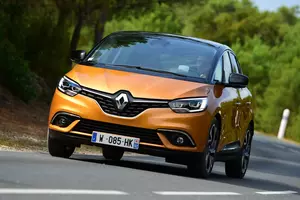
2016 Scenic IV
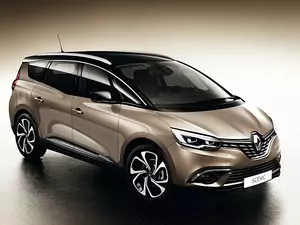
2016 Grand Scenic IV
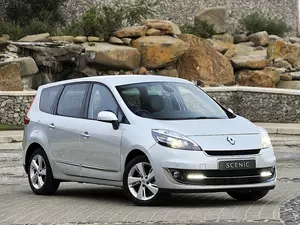
2013 Grand Scenic III (Phase III)
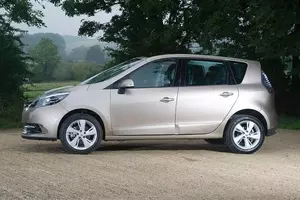
2013 Scenic III (Phase III)
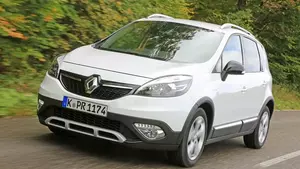
2013 Scenic III XMOD
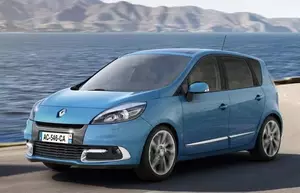
2012 Scenic III (collection 2012)

2012 Grand Scenic II (collection 2012)
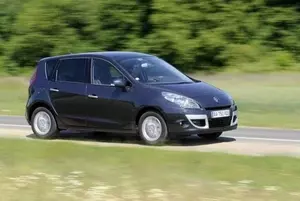
2009 Scenic III
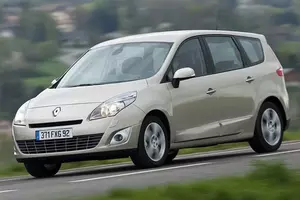
2009 Grand Scenic II
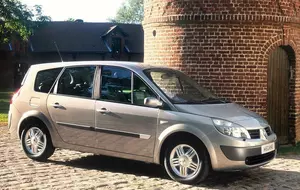
2005 Grand Scenic I (Phase I)
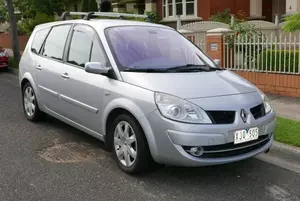
2006 Scenic II (Phase II)
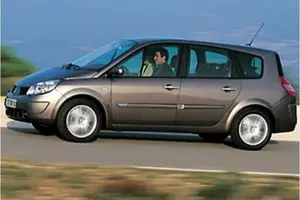
2006 Grand Scenic I (Phase II)
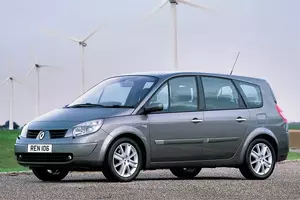
2003 Scenic II (Phase I)

1999 Scenic I (Phase II)
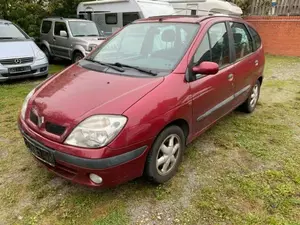
2000 Scenic I RX
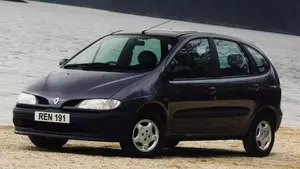
1996 Scenic I (Phase I)

| Vehicle | Precise engine size | Difference from world average | Engine size to consumption ratio | Horsepower from 1 L | Engine size to 100 kg of weight |
|---|---|---|---|---|---|
| 1.6 Energy dCi |
1.6 L (1600 cc) |
31.8% smaller | 31 cc to 1 mpg | 100 hp from 1 L | 107 cc to 100 kg |
| 1.5 Energy dCi |
1.46 L (1461 cc) |
37.7% smaller | 24 cc to 1 mpg | 75 hp from 1 L | 104 cc to 100 kg |
| 1.2 Energy TCe |
1.2 L (1198 cc) |
48.9% smaller | 29 cc to 1 mpg | 96 hp from 1 L | 86 cc to 100 kg |
| 1.3 Energy TCe |
1.33 L (1330 cc) |
43.3% smaller | 30 cc to 1 mpg | 120 hp from 1 L | 95 cc to 100 kg |
| 1.7 Blue dCi |
1.75 L (1749 cc) |
25.4% smaller | - | 69 hp from 1 L | 103 cc to 100 kg |
| 1.3 TCe |
1.33 L (1332 cc) |
43.2% smaller | 34 cc to 1 mpg | 86 hp from 1 L | 89 cc to 100 kg |
| Vehicle | 1.6 Energy dCi |
|---|---|
| Precise engine size | 1.6 L (1600 cc) |
| Difference from world average | 31.8 smaller |
| Engine size to consumption ratio | 31 cc to 1 mpg |
| Horsepower from 1 L | 100 hp from 1 L |
| Engine size to 100 kg of weight | 107 cc to 100 kg |
| Vehicle | 1.5 Energy dCi |
| Precise engine size | 1.46 L (1461 cc) |
| Difference from world average | 37.7 smaller |
| Engine size to consumption ratio | 24 cc to 1 mpg |
| Horsepower from 1 L | 75 hp from 1 L |
| Engine size to 100 kg of weight | 104 cc to 100 kg |
| Vehicle | 1.2 Energy TCe |
| Precise engine size | 1.2 L (1198 cc) |
| Difference from world average | 48.9 smaller |
| Engine size to consumption ratio | 29 cc to 1 mpg |
| Horsepower from 1 L | 96 hp from 1 L |
| Engine size to 100 kg of weight | 86 cc to 100 kg |
| Vehicle | 1.3 Energy TCe |
| Precise engine size | 1.33 L (1330 cc) |
| Difference from world average | 43.3 smaller |
| Engine size to consumption ratio | 30 cc to 1 mpg |
| Horsepower from 1 L | 120 hp from 1 L |
| Engine size to 100 kg of weight | 95 cc to 100 kg |
| Vehicle | 1.7 Blue dCi |
| Precise engine size | 1.75 L (1749 cc) |
| Difference from world average | 25.4 smaller |
| Engine size to consumption ratio | - |
| Horsepower from 1 L | 69 hp from 1 L |
| Engine size to 100 kg of weight | 103 cc to 100 kg |
| Vehicle | 1.3 TCe |
| Precise engine size | 1.33 L (1332 cc) |
| Difference from world average | 43.2 smaller |
| Engine size to consumption ratio | 34 cc to 1 mpg |
| Horsepower from 1 L | 86 hp from 1 L |
| Engine size to 100 kg of weight | 89 cc to 100 kg |

| Vehicle | Precise engine size | Difference from world average | Engine size to consumption ratio | Horsepower from 1 L | Engine size to 100 kg of weight |
|---|---|---|---|---|---|
| 1.6 Energy dCi |
1.6 L (1600 cc) |
31.8% smaller | 31 cc to 1 mpg | 81 hp from 1 L | 100 cc to 100 kg |
| 1.5 Energy dCi |
1.46 L (1461 cc) |
37.7% smaller | 22 cc to 1 mpg | 75 hp from 1 L | 97 cc to 100 kg |
| 1.2 Energy TCe |
1.2 L (1198 cc) |
48.9% smaller | 31 cc to 1 mpg | 108 hp from 1 L | 80 cc to 100 kg |
| 1.3 Energy TCe |
1.33 L (1330 cc) |
43.3% smaller | 32 cc to 1 mpg | 120 hp from 1 L | 89 cc to 100 kg |
| 1.7 Blue dCi |
1.75 L (1749 cc) |
25.4% smaller | 36 cc to 1 mpg | 69 hp from 1 L | 97 cc to 100 kg |
| 1.3 TCe |
1.33 L (1332 cc) |
43.2% smaller | - | 120 hp from 1 L | 83 cc to 100 kg |
| Vehicle | 1.6 Energy dCi |
|---|---|
| Precise engine size | 1.6 L (1600 cc) |
| Difference from world average | 31.8 smaller |
| Engine size to consumption ratio | 31 cc to 1 mpg |
| Horsepower from 1 L | 81 hp from 1 L |
| Engine size to 100 kg of weight | 100 cc to 100 kg |
| Vehicle | 1.5 Energy dCi |
| Precise engine size | 1.46 L (1461 cc) |
| Difference from world average | 37.7 smaller |
| Engine size to consumption ratio | 22 cc to 1 mpg |
| Horsepower from 1 L | 75 hp from 1 L |
| Engine size to 100 kg of weight | 97 cc to 100 kg |
| Vehicle | 1.2 Energy TCe |
| Precise engine size | 1.2 L (1198 cc) |
| Difference from world average | 48.9 smaller |
| Engine size to consumption ratio | 31 cc to 1 mpg |
| Horsepower from 1 L | 108 hp from 1 L |
| Engine size to 100 kg of weight | 80 cc to 100 kg |
| Vehicle | 1.3 Energy TCe |
| Precise engine size | 1.33 L (1330 cc) |
| Difference from world average | 43.3 smaller |
| Engine size to consumption ratio | 32 cc to 1 mpg |
| Horsepower from 1 L | 120 hp from 1 L |
| Engine size to 100 kg of weight | 89 cc to 100 kg |
| Vehicle | 1.7 Blue dCi |
| Precise engine size | 1.75 L (1749 cc) |
| Difference from world average | 25.4 smaller |
| Engine size to consumption ratio | 36 cc to 1 mpg |
| Horsepower from 1 L | 69 hp from 1 L |
| Engine size to 100 kg of weight | 97 cc to 100 kg |
| Vehicle | 1.3 TCe |
| Precise engine size | 1.33 L (1332 cc) |
| Difference from world average | 43.2 smaller |
| Engine size to consumption ratio | - |
| Horsepower from 1 L | 120 hp from 1 L |
| Engine size to 100 kg of weight | 83 cc to 100 kg |

| Vehicle | Precise engine size | Difference from world average | Engine size to consumption ratio | Horsepower from 1 L | Engine size to 100 kg of weight |
|---|---|---|---|---|---|
| 2.0 16V |
2 L (1997 cc) |
14.9% smaller | 69 cc to 1 mpg | 70 hp from 1 L | 125 cc to 100 kg |
| 1.5 dCi |
1.46 L (1461 cc) |
37.7% smaller | 29 cc to 1 mpg | 75 hp from 1 L | 97 cc to 100 kg |
| 2.0 dCi |
2 L (1995 cc) |
15% smaller | 59 cc to 1 mpg | 75 hp from 1 L | 117 cc to 100 kg |
| 1.6 dCi |
1.6 L (1598 cc) |
31.9% smaller | 31 cc to 1 mpg | 81 hp from 1 L | 100 cc to 100 kg |
| 1.2 TCe |
1.2 L (1197 cc) |
49% smaller | 31 cc to 1 mpg | 96 hp from 1 L | 80 cc to 100 kg |
| 1.6 16V |
1.6 L (1598 cc) |
31.9% smaller | 52 cc to 1 mpg | 69 hp from 1 L | 107 cc to 100 kg |
| Vehicle | 2.0 16V |
|---|---|
| Precise engine size | 2 L (1997 cc) |
| Difference from world average | 14.9 smaller |
| Engine size to consumption ratio | 69 cc to 1 mpg |
| Horsepower from 1 L | 70 hp from 1 L |
| Engine size to 100 kg of weight | 125 cc to 100 kg |
| Vehicle | 1.5 dCi |
| Precise engine size | 1.46 L (1461 cc) |
| Difference from world average | 37.7 smaller |
| Engine size to consumption ratio | 29 cc to 1 mpg |
| Horsepower from 1 L | 75 hp from 1 L |
| Engine size to 100 kg of weight | 97 cc to 100 kg |
| Vehicle | 2.0 dCi |
| Precise engine size | 2 L (1995 cc) |
| Difference from world average | 15 smaller |
| Engine size to consumption ratio | 59 cc to 1 mpg |
| Horsepower from 1 L | 75 hp from 1 L |
| Engine size to 100 kg of weight | 117 cc to 100 kg |
| Vehicle | 1.6 dCi |
| Precise engine size | 1.6 L (1598 cc) |
| Difference from world average | 31.9 smaller |
| Engine size to consumption ratio | 31 cc to 1 mpg |
| Horsepower from 1 L | 81 hp from 1 L |
| Engine size to 100 kg of weight | 100 cc to 100 kg |
| Vehicle | 1.2 TCe |
| Precise engine size | 1.2 L (1197 cc) |
| Difference from world average | 49 smaller |
| Engine size to consumption ratio | 31 cc to 1 mpg |
| Horsepower from 1 L | 96 hp from 1 L |
| Engine size to 100 kg of weight | 80 cc to 100 kg |
| Vehicle | 1.6 16V |
| Precise engine size | 1.6 L (1598 cc) |
| Difference from world average | 31.9 smaller |
| Engine size to consumption ratio | 52 cc to 1 mpg |
| Horsepower from 1 L | 69 hp from 1 L |
| Engine size to 100 kg of weight | 107 cc to 100 kg |

| Vehicle | Precise engine size | Difference from world average | Engine size to consumption ratio | Horsepower from 1 L | Engine size to 100 kg of weight |
|---|---|---|---|---|---|
| 1.2 TCe |
1.2 L (1197 cc) |
49% smaller | 32 cc to 1 mpg | 110 hp from 1 L | 86 cc to 100 kg |
| 2.0 dCi |
2 L (1995 cc) |
15% smaller | 59 cc to 1 mpg | 75 hp from 1 L | 125 cc to 100 kg |
| 1.5 dCi |
1.46 L (1461 cc) |
37.7% smaller | 30 cc to 1 mpg | 75 hp from 1 L | 97 cc to 100 kg |
| 1.6 dCi |
1.6 L (1598 cc) |
31.9% smaller | 31 cc to 1 mpg | 81 hp from 1 L | 107 cc to 100 kg |
| 2.0 16V |
2 L (1997 cc) |
14.9% smaller | 69 cc to 1 mpg | 70 hp from 1 L | 133 cc to 100 kg |
| 1.6 16V |
1.6 L (1598 cc) |
31.9% smaller | 50 cc to 1 mpg | 69 hp from 1 L | 114 cc to 100 kg |
| Vehicle | 1.2 TCe |
|---|---|
| Precise engine size | 1.2 L (1197 cc) |
| Difference from world average | 49 smaller |
| Engine size to consumption ratio | 32 cc to 1 mpg |
| Horsepower from 1 L | 110 hp from 1 L |
| Engine size to 100 kg of weight | 86 cc to 100 kg |
| Vehicle | 2.0 dCi |
| Precise engine size | 2 L (1995 cc) |
| Difference from world average | 15 smaller |
| Engine size to consumption ratio | 59 cc to 1 mpg |
| Horsepower from 1 L | 75 hp from 1 L |
| Engine size to 100 kg of weight | 125 cc to 100 kg |
| Vehicle | 1.5 dCi |
| Precise engine size | 1.46 L (1461 cc) |
| Difference from world average | 37.7 smaller |
| Engine size to consumption ratio | 30 cc to 1 mpg |
| Horsepower from 1 L | 75 hp from 1 L |
| Engine size to 100 kg of weight | 97 cc to 100 kg |
| Vehicle | 1.6 dCi |
| Precise engine size | 1.6 L (1598 cc) |
| Difference from world average | 31.9 smaller |
| Engine size to consumption ratio | 31 cc to 1 mpg |
| Horsepower from 1 L | 81 hp from 1 L |
| Engine size to 100 kg of weight | 107 cc to 100 kg |
| Vehicle | 2.0 16V |
| Precise engine size | 2 L (1997 cc) |
| Difference from world average | 14.9 smaller |
| Engine size to consumption ratio | 69 cc to 1 mpg |
| Horsepower from 1 L | 70 hp from 1 L |
| Engine size to 100 kg of weight | 133 cc to 100 kg |
| Vehicle | 1.6 16V |
| Precise engine size | 1.6 L (1598 cc) |
| Difference from world average | 31.9 smaller |
| Engine size to consumption ratio | 50 cc to 1 mpg |
| Horsepower from 1 L | 69 hp from 1 L |
| Engine size to 100 kg of weight | 114 cc to 100 kg |

| Vehicle | Precise engine size | Difference from world average | Engine size to consumption ratio | Horsepower from 1 L | Engine size to 100 kg of weight |
|---|---|---|---|---|---|
| 1.6 dCi |
1.6 L (1598 cc) |
31.9% smaller | 30 cc to 1 mpg | 81 hp from 1 L | 107 cc to 100 kg |
| 1.2 TCe |
1.2 L (1197 cc) |
49% smaller | 31 cc to 1 mpg | 96 hp from 1 L | 86 cc to 100 kg |
| 1.5 dCi |
1.46 L (1461 cc) |
37.7% smaller | 29 cc to 1 mpg | 75 hp from 1 L | 97 cc to 100 kg |
| Vehicle | 1.6 dCi |
|---|---|
| Precise engine size | 1.6 L (1598 cc) |
| Difference from world average | 31.9 smaller |
| Engine size to consumption ratio | 30 cc to 1 mpg |
| Horsepower from 1 L | 81 hp from 1 L |
| Engine size to 100 kg of weight | 107 cc to 100 kg |
| Vehicle | 1.2 TCe |
| Precise engine size | 1.2 L (1197 cc) |
| Difference from world average | 49 smaller |
| Engine size to consumption ratio | 31 cc to 1 mpg |
| Horsepower from 1 L | 96 hp from 1 L |
| Engine size to 100 kg of weight | 86 cc to 100 kg |
| Vehicle | 1.5 dCi |
| Precise engine size | 1.46 L (1461 cc) |
| Difference from world average | 37.7 smaller |
| Engine size to consumption ratio | 29 cc to 1 mpg |
| Horsepower from 1 L | 75 hp from 1 L |
| Engine size to 100 kg of weight | 97 cc to 100 kg |

| Vehicle | Precise engine size | Difference from world average | Engine size to consumption ratio | Horsepower from 1 L | Engine size to 100 kg of weight |
|---|---|---|---|---|---|
| 1.6 16V |
1.6 L (1598 cc) |
31.9% smaller | 50 cc to 1 mpg | 69 hp from 1 L | 114 cc to 100 kg |
| dCi |
1.46 L (1461 cc) |
37.7% smaller | 30 cc to 1 mpg | 75 hp from 1 L | 104 cc to 100 kg |
| Vehicle | 1.6 16V |
|---|---|
| Precise engine size | 1.6 L (1598 cc) |
| Difference from world average | 31.9 smaller |
| Engine size to consumption ratio | 50 cc to 1 mpg |
| Horsepower from 1 L | 69 hp from 1 L |
| Engine size to 100 kg of weight | 114 cc to 100 kg |
| Vehicle | dCi |
| Precise engine size | 1.46 L (1461 cc) |
| Difference from world average | 37.7 smaller |
| Engine size to consumption ratio | 30 cc to 1 mpg |
| Horsepower from 1 L | 75 hp from 1 L |
| Engine size to 100 kg of weight | 104 cc to 100 kg |

| Vehicle | Precise engine size | Difference from world average | Engine size to consumption ratio | Horsepower from 1 L | Engine size to 100 kg of weight |
|---|---|---|---|---|---|
| TCe |
1.4 L (1397 cc) |
40.5% smaller | 44 cc to 1 mpg | 93 hp from 1 L | 93 cc to 100 kg |
| 1.6 dCi energy |
1.6 L (1598 cc) |
31.9% smaller | 30 cc to 1 mpg | 81 hp from 1 L | 100 cc to 100 kg |
| Vehicle | TCe |
|---|---|
| Precise engine size | 1.4 L (1397 cc) |
| Difference from world average | 40.5 smaller |
| Engine size to consumption ratio | 44 cc to 1 mpg |
| Horsepower from 1 L | 93 hp from 1 L |
| Engine size to 100 kg of weight | 93 cc to 100 kg |
| Vehicle | 1.6 dCi energy |
| Precise engine size | 1.6 L (1598 cc) |
| Difference from world average | 31.9 smaller |
| Engine size to consumption ratio | 30 cc to 1 mpg |
| Horsepower from 1 L | 81 hp from 1 L |
| Engine size to 100 kg of weight | 100 cc to 100 kg |

| Vehicle | Precise engine size | Difference from world average | Engine size to consumption ratio | Horsepower from 1 L | Engine size to 100 kg of weight |
|---|---|---|---|---|---|
| 2.0 16V |
2 L (1995 cc) |
15% smaller | 64 cc to 1 mpg | 70 hp from 1 L | 143 cc to 100 kg |
| 1.4 TCe |
1.4 L (1395 cc) |
40.5% smaller | 42 cc to 1 mpg | 93 hp from 1 L | 107 cc to 100 kg |
| 2.0 dCi |
2 L (1995 cc) |
15% smaller | 59 cc to 1 mpg | 75 hp from 1 L | 133 cc to 100 kg |
| 1.5 dCi |
1.46 L (1461 cc) |
37.7% smaller | 32 cc to 1 mpg | 75 hp from 1 L | 104 cc to 100 kg |
| 1.6 Energy dCi |
1.6 L (1598 cc) |
31.9% smaller | 31 cc to 1 mpg | 81 hp from 1 L | 114 cc to 100 kg |
| 1.6 16V |
1.6 L (1598 cc) |
31.9% smaller | 50 cc to 1 mpg | 69 hp from 1 L | 123 cc to 100 kg |
| 1.9 dCi |
1.87 L (1870 cc) |
20.3% smaller | 43 cc to 1 mpg | 70 hp from 1 L | 134 cc to 100 kg |
| Vehicle | 2.0 16V |
|---|---|
| Precise engine size | 2 L (1995 cc) |
| Difference from world average | 15 smaller |
| Engine size to consumption ratio | 64 cc to 1 mpg |
| Horsepower from 1 L | 70 hp from 1 L |
| Engine size to 100 kg of weight | 143 cc to 100 kg |
| Vehicle | 1.4 TCe |
| Precise engine size | 1.4 L (1395 cc) |
| Difference from world average | 40.5 smaller |
| Engine size to consumption ratio | 42 cc to 1 mpg |
| Horsepower from 1 L | 93 hp from 1 L |
| Engine size to 100 kg of weight | 107 cc to 100 kg |
| Vehicle | 2.0 dCi |
| Precise engine size | 2 L (1995 cc) |
| Difference from world average | 15 smaller |
| Engine size to consumption ratio | 59 cc to 1 mpg |
| Horsepower from 1 L | 75 hp from 1 L |
| Engine size to 100 kg of weight | 133 cc to 100 kg |
| Vehicle | 1.5 dCi |
| Precise engine size | 1.46 L (1461 cc) |
| Difference from world average | 37.7 smaller |
| Engine size to consumption ratio | 32 cc to 1 mpg |
| Horsepower from 1 L | 75 hp from 1 L |
| Engine size to 100 kg of weight | 104 cc to 100 kg |
| Vehicle | 1.6 Energy dCi |
| Precise engine size | 1.6 L (1598 cc) |
| Difference from world average | 31.9 smaller |
| Engine size to consumption ratio | 31 cc to 1 mpg |
| Horsepower from 1 L | 81 hp from 1 L |
| Engine size to 100 kg of weight | 114 cc to 100 kg |
| Vehicle | 1.6 16V |
| Precise engine size | 1.6 L (1598 cc) |
| Difference from world average | 31.9 smaller |
| Engine size to consumption ratio | 50 cc to 1 mpg |
| Horsepower from 1 L | 69 hp from 1 L |
| Engine size to 100 kg of weight | 123 cc to 100 kg |
| Vehicle | 1.9 dCi |
| Precise engine size | 1.87 L (1870 cc) |
| Difference from world average | 20.3 smaller |
| Engine size to consumption ratio | 43 cc to 1 mpg |
| Horsepower from 1 L | 70 hp from 1 L |
| Engine size to 100 kg of weight | 134 cc to 100 kg |

| Vehicle | Precise engine size | Difference from world average | Engine size to consumption ratio | Horsepower from 1 L | Engine size to 100 kg of weight |
|---|---|---|---|---|---|
| 1.6 16V |
1.6 L (1598 cc) |
31.9% smaller | 53 cc to 1 mpg | 69 hp from 1 L | 114 cc to 100 kg |
| 1.4 TCe |
1.4 L (1395 cc) |
40.5% smaller | 44 cc to 1 mpg | 93 hp from 1 L | 100 cc to 100 kg |
| 1.9 dCi |
1.87 L (1870 cc) |
20.3% smaller | 45 cc to 1 mpg | 70 hp from 1 L | 125 cc to 100 kg |
| 1.5 dCi |
1.46 L (1461 cc) |
37.7% smaller | 31 cc to 1 mpg | 75 hp from 1 L | 97 cc to 100 kg |
| 2.0 dCi |
2 L (1995 cc) |
15% smaller | 59 cc to 1 mpg | 75 hp from 1 L | 125 cc to 100 kg |
| 1.6 Energy dCi |
1.6 L (1598 cc) |
31.9% smaller | 31 cc to 1 mpg | 81 hp from 1 L | 107 cc to 100 kg |
| 2.0 16V |
2 L (1997 cc) |
14.9% smaller | 64 cc to 1 mpg | 70 hp from 1 L | 143 cc to 100 kg |
| Vehicle | 1.6 16V |
|---|---|
| Precise engine size | 1.6 L (1598 cc) |
| Difference from world average | 31.9 smaller |
| Engine size to consumption ratio | 53 cc to 1 mpg |
| Horsepower from 1 L | 69 hp from 1 L |
| Engine size to 100 kg of weight | 114 cc to 100 kg |
| Vehicle | 1.4 TCe |
| Precise engine size | 1.4 L (1395 cc) |
| Difference from world average | 40.5 smaller |
| Engine size to consumption ratio | 44 cc to 1 mpg |
| Horsepower from 1 L | 93 hp from 1 L |
| Engine size to 100 kg of weight | 100 cc to 100 kg |
| Vehicle | 1.9 dCi |
| Precise engine size | 1.87 L (1870 cc) |
| Difference from world average | 20.3 smaller |
| Engine size to consumption ratio | 45 cc to 1 mpg |
| Horsepower from 1 L | 70 hp from 1 L |
| Engine size to 100 kg of weight | 125 cc to 100 kg |
| Vehicle | 1.5 dCi |
| Precise engine size | 1.46 L (1461 cc) |
| Difference from world average | 37.7 smaller |
| Engine size to consumption ratio | 31 cc to 1 mpg |
| Horsepower from 1 L | 75 hp from 1 L |
| Engine size to 100 kg of weight | 97 cc to 100 kg |
| Vehicle | 2.0 dCi |
| Precise engine size | 2 L (1995 cc) |
| Difference from world average | 15 smaller |
| Engine size to consumption ratio | 59 cc to 1 mpg |
| Horsepower from 1 L | 75 hp from 1 L |
| Engine size to 100 kg of weight | 125 cc to 100 kg |
| Vehicle | 1.6 Energy dCi |
| Precise engine size | 1.6 L (1598 cc) |
| Difference from world average | 31.9 smaller |
| Engine size to consumption ratio | 31 cc to 1 mpg |
| Horsepower from 1 L | 81 hp from 1 L |
| Engine size to 100 kg of weight | 107 cc to 100 kg |
| Vehicle | 2.0 16V |
| Precise engine size | 2 L (1997 cc) |
| Difference from world average | 14.9 smaller |
| Engine size to consumption ratio | 64 cc to 1 mpg |
| Horsepower from 1 L | 70 hp from 1 L |
| Engine size to 100 kg of weight | 143 cc to 100 kg |

| Vehicle | Precise engine size | Difference from world average | Engine size to consumption ratio | Horsepower from 1 L | Engine size to 100 kg of weight |
|---|---|---|---|---|---|
| 2.0 16V |
2 L (1998 cc) |
14.8% smaller | 74 cc to 1 mpg | 68 hp from 1 L | 133 cc to 100 kg |
| 1.5 dCi |
1.46 L (1461 cc) |
37.7% smaller | 33 cc to 1 mpg | 73 hp from 1 L | 97 cc to 100 kg |
| 1.6 16V |
1.6 L (1598 cc) |
31.9% smaller | 50 cc to 1 mpg | 71 hp from 1 L | 114 cc to 100 kg |
| 1.9 dCi |
1.87 L (1870 cc) |
20.3% smaller | 48 cc to 1 mpg | 59 hp from 1 L | 125 cc to 100 kg |
| 2.0 16V Turbo |
2 L (1998 cc) |
14.8% smaller | 69 cc to 1 mpg | 82 hp from 1 L | 125 cc to 100 kg |
| 2.0 dCi |
2 L (1995 cc) |
15% smaller | 49 cc to 1 mpg | 75 hp from 1 L | 133 cc to 100 kg |
| Vehicle | 2.0 16V |
|---|---|
| Precise engine size | 2 L (1998 cc) |
| Difference from world average | 14.8 smaller |
| Engine size to consumption ratio | 74 cc to 1 mpg |
| Horsepower from 1 L | 68 hp from 1 L |
| Engine size to 100 kg of weight | 133 cc to 100 kg |
| Vehicle | 1.5 dCi |
| Precise engine size | 1.46 L (1461 cc) |
| Difference from world average | 37.7 smaller |
| Engine size to consumption ratio | 33 cc to 1 mpg |
| Horsepower from 1 L | 73 hp from 1 L |
| Engine size to 100 kg of weight | 97 cc to 100 kg |
| Vehicle | 1.6 16V |
| Precise engine size | 1.6 L (1598 cc) |
| Difference from world average | 31.9 smaller |
| Engine size to consumption ratio | 50 cc to 1 mpg |
| Horsepower from 1 L | 71 hp from 1 L |
| Engine size to 100 kg of weight | 114 cc to 100 kg |
| Vehicle | 1.9 dCi |
| Precise engine size | 1.87 L (1870 cc) |
| Difference from world average | 20.3 smaller |
| Engine size to consumption ratio | 48 cc to 1 mpg |
| Horsepower from 1 L | 59 hp from 1 L |
| Engine size to 100 kg of weight | 125 cc to 100 kg |
| Vehicle | 2.0 16V Turbo |
| Precise engine size | 2 L (1998 cc) |
| Difference from world average | 14.8 smaller |
| Engine size to consumption ratio | 69 cc to 1 mpg |
| Horsepower from 1 L | 82 hp from 1 L |
| Engine size to 100 kg of weight | 125 cc to 100 kg |
| Vehicle | 2.0 dCi |
| Precise engine size | 2 L (1995 cc) |
| Difference from world average | 15 smaller |
| Engine size to consumption ratio | 49 cc to 1 mpg |
| Horsepower from 1 L | 75 hp from 1 L |
| Engine size to 100 kg of weight | 133 cc to 100 kg |

| Vehicle | Precise engine size | Difference from world average | Engine size to consumption ratio | Horsepower from 1 L | Engine size to 100 kg of weight |
|---|---|---|---|---|---|
| 1.4 i 16V |
1.39 L (1390 cc) |
40.8% smaller | 42 cc to 1 mpg | 71 hp from 1 L | 107 cc to 100 kg |
| 1.6 i 16V |
1.6 L (1598 cc) |
31.9% smaller | 55 cc to 1 mpg | 70 hp from 1 L | 114 cc to 100 kg |
| 2.0 i 16V |
2 L (1998 cc) |
14.8% smaller | 74 cc to 1 mpg | 68 hp from 1 L | 143 cc to 100 kg |
| 1.9 dCi |
1.87 L (1870 cc) |
20.3% smaller | 48 cc to 1 mpg | 70 hp from 1 L | 134 cc to 100 kg |
| 1.5 dCi |
1.46 L (1461 cc) |
37.7% smaller | 33 cc to 1 mpg | 71 hp from 1 L | 104 cc to 100 kg |
| Vehicle | 1.4 i 16V |
|---|---|
| Precise engine size | 1.39 L (1390 cc) |
| Difference from world average | 40.8 smaller |
| Engine size to consumption ratio | 42 cc to 1 mpg |
| Horsepower from 1 L | 71 hp from 1 L |
| Engine size to 100 kg of weight | 107 cc to 100 kg |
| Vehicle | 1.6 i 16V |
| Precise engine size | 1.6 L (1598 cc) |
| Difference from world average | 31.9 smaller |
| Engine size to consumption ratio | 55 cc to 1 mpg |
| Horsepower from 1 L | 70 hp from 1 L |
| Engine size to 100 kg of weight | 114 cc to 100 kg |
| Vehicle | 2.0 i 16V |
| Precise engine size | 2 L (1998 cc) |
| Difference from world average | 14.8 smaller |
| Engine size to consumption ratio | 74 cc to 1 mpg |
| Horsepower from 1 L | 68 hp from 1 L |
| Engine size to 100 kg of weight | 143 cc to 100 kg |
| Vehicle | 1.9 dCi |
| Precise engine size | 1.87 L (1870 cc) |
| Difference from world average | 20.3 smaller |
| Engine size to consumption ratio | 48 cc to 1 mpg |
| Horsepower from 1 L | 70 hp from 1 L |
| Engine size to 100 kg of weight | 134 cc to 100 kg |
| Vehicle | 1.5 dCi |
| Precise engine size | 1.46 L (1461 cc) |
| Difference from world average | 37.7 smaller |
| Engine size to consumption ratio | 33 cc to 1 mpg |
| Horsepower from 1 L | 71 hp from 1 L |
| Engine size to 100 kg of weight | 104 cc to 100 kg |

| Vehicle | Precise engine size | Difference from world average | Engine size to consumption ratio | Horsepower from 1 L | Engine size to 100 kg of weight |
|---|---|---|---|---|---|
| 2.0 i 16V T |
2 L (1998 cc) |
14.8% smaller | 69 cc to 1 mpg | 82 hp from 1 L | 133 cc to 100 kg |
| 1.6 i 16V |
1.6 L (1598 cc) |
31.9% smaller | 53 cc to 1 mpg | 70 hp from 1 L | 114 cc to 100 kg |
| 2.0 i 16V |
2 L (1998 cc) |
14.8% smaller | 69 cc to 1 mpg | 68 hp from 1 L | 133 cc to 100 kg |
| 1.5 dCi |
1.46 L (1461 cc) |
37.7% smaller | 33 cc to 1 mpg | 71 hp from 1 L | 104 cc to 100 kg |
| 1.9 dCi |
1.87 L (1870 cc) |
20.3% smaller | 57 cc to 1 mpg | 70 hp from 1 L | 125 cc to 100 kg |
| 2.0 dCi |
2 L (1995 cc) |
15% smaller | 60 cc to 1 mpg | 75 hp from 1 L | 125 cc to 100 kg |
| Vehicle | 2.0 i 16V T |
|---|---|
| Precise engine size | 2 L (1998 cc) |
| Difference from world average | 14.8 smaller |
| Engine size to consumption ratio | 69 cc to 1 mpg |
| Horsepower from 1 L | 82 hp from 1 L |
| Engine size to 100 kg of weight | 133 cc to 100 kg |
| Vehicle | 1.6 i 16V |
| Precise engine size | 1.6 L (1598 cc) |
| Difference from world average | 31.9 smaller |
| Engine size to consumption ratio | 53 cc to 1 mpg |
| Horsepower from 1 L | 70 hp from 1 L |
| Engine size to 100 kg of weight | 114 cc to 100 kg |
| Vehicle | 2.0 i 16V |
| Precise engine size | 2 L (1998 cc) |
| Difference from world average | 14.8 smaller |
| Engine size to consumption ratio | 69 cc to 1 mpg |
| Horsepower from 1 L | 68 hp from 1 L |
| Engine size to 100 kg of weight | 133 cc to 100 kg |
| Vehicle | 1.5 dCi |
| Precise engine size | 1.46 L (1461 cc) |
| Difference from world average | 37.7 smaller |
| Engine size to consumption ratio | 33 cc to 1 mpg |
| Horsepower from 1 L | 71 hp from 1 L |
| Engine size to 100 kg of weight | 104 cc to 100 kg |
| Vehicle | 1.9 dCi |
| Precise engine size | 1.87 L (1870 cc) |
| Difference from world average | 20.3 smaller |
| Engine size to consumption ratio | 57 cc to 1 mpg |
| Horsepower from 1 L | 70 hp from 1 L |
| Engine size to 100 kg of weight | 125 cc to 100 kg |
| Vehicle | 2.0 dCi |
| Precise engine size | 2 L (1995 cc) |
| Difference from world average | 15 smaller |
| Engine size to consumption ratio | 60 cc to 1 mpg |
| Horsepower from 1 L | 75 hp from 1 L |
| Engine size to 100 kg of weight | 125 cc to 100 kg |

| Vehicle | Precise engine size | Difference from world average | Engine size to consumption ratio | Horsepower from 1 L | Engine size to 100 kg of weight |
|---|---|---|---|---|---|
| 1.5 dCi |
1.46 L (1461 cc) |
37.7% smaller | 32 cc to 1 mpg | 69 hp from 1 L | 112 cc to 100 kg |
| 1.9 dCi |
1.87 L (1870 cc) |
20.3% smaller | 46 cc to 1 mpg | 64 hp from 1 L | 134 cc to 100 kg |
| 2.0 dCi |
2 L (1995 cc) |
15% smaller | 49 cc to 1 mpg | 75 hp from 1 L | 133 cc to 100 kg |
| 1.6 i 16V |
1.6 L (1598 cc) |
31.9% smaller | 55 cc to 1 mpg | 71 hp from 1 L | 114 cc to 100 kg |
| 1.4 i 16V |
1.39 L (1390 cc) |
40.8% smaller | 43 cc to 1 mpg | 71 hp from 1 L | 107 cc to 100 kg |
| 2.0 i 16V |
2 L (1998 cc) |
14.8% smaller | 74 cc to 1 mpg | 68 hp from 1 L | 143 cc to 100 kg |
| 2.0 i 16V T |
2 L (1998 cc) |
14.8% smaller | 69 cc to 1 mpg | 82 hp from 1 L | 143 cc to 100 kg |
| Vehicle | 1.5 dCi |
|---|---|
| Precise engine size | 1.46 L (1461 cc) |
| Difference from world average | 37.7 smaller |
| Engine size to consumption ratio | 32 cc to 1 mpg |
| Horsepower from 1 L | 69 hp from 1 L |
| Engine size to 100 kg of weight | 112 cc to 100 kg |
| Vehicle | 1.9 dCi |
| Precise engine size | 1.87 L (1870 cc) |
| Difference from world average | 20.3 smaller |
| Engine size to consumption ratio | 46 cc to 1 mpg |
| Horsepower from 1 L | 64 hp from 1 L |
| Engine size to 100 kg of weight | 134 cc to 100 kg |
| Vehicle | 2.0 dCi |
| Precise engine size | 2 L (1995 cc) |
| Difference from world average | 15 smaller |
| Engine size to consumption ratio | 49 cc to 1 mpg |
| Horsepower from 1 L | 75 hp from 1 L |
| Engine size to 100 kg of weight | 133 cc to 100 kg |
| Vehicle | 1.6 i 16V |
| Precise engine size | 1.6 L (1598 cc) |
| Difference from world average | 31.9 smaller |
| Engine size to consumption ratio | 55 cc to 1 mpg |
| Horsepower from 1 L | 71 hp from 1 L |
| Engine size to 100 kg of weight | 114 cc to 100 kg |
| Vehicle | 1.4 i 16V |
| Precise engine size | 1.39 L (1390 cc) |
| Difference from world average | 40.8 smaller |
| Engine size to consumption ratio | 43 cc to 1 mpg |
| Horsepower from 1 L | 71 hp from 1 L |
| Engine size to 100 kg of weight | 107 cc to 100 kg |
| Vehicle | 2.0 i 16V |
| Precise engine size | 2 L (1998 cc) |
| Difference from world average | 14.8 smaller |
| Engine size to consumption ratio | 74 cc to 1 mpg |
| Horsepower from 1 L | 68 hp from 1 L |
| Engine size to 100 kg of weight | 143 cc to 100 kg |
| Vehicle | 2.0 i 16V T |
| Precise engine size | 2 L (1998 cc) |
| Difference from world average | 14.8 smaller |
| Engine size to consumption ratio | 69 cc to 1 mpg |
| Horsepower from 1 L | 82 hp from 1 L |
| Engine size to 100 kg of weight | 143 cc to 100 kg |

| Vehicle | Precise engine size | Difference from world average | Engine size to consumption ratio | Horsepower from 1 L | Engine size to 100 kg of weight |
|---|---|---|---|---|---|
| 1.4 i 16V |
1.39 L (1390 cc) |
40.8% smaller | - | 68 hp from 1 L | 116 cc to 100 kg |
| 1.4 |
1.39 L (1390 cc) |
40.8% smaller | - | 54 hp from 1 L | 126 cc to 100 kg |
| 1.6i |
1.6 L (1598 cc) |
31.9% smaller | 55 cc to 1 mpg | 56 hp from 1 L | 145 cc to 100 kg |
| 1.6 i 16V |
1.6 L (1598 cc) |
31.9% smaller | 52 cc to 1 mpg | 67 hp from 1 L | 123 cc to 100 kg |
| 1.9 dTi |
1.87 L (1870 cc) |
20.3% smaller | 49 cc to 1 mpg | 52 hp from 1 L | 144 cc to 100 kg |
| 1.9 D |
1.87 L (1870 cc) |
20.3% smaller | - | 34 hp from 1 L | 144 cc to 100 kg |
| 1.9 dCi |
1.87 L (1870 cc) |
20.3% smaller | 49 cc to 1 mpg | 55 hp from 1 L | 134 cc to 100 kg |
| 1.8 16V |
1.78 L (1783 cc) |
24% smaller | 59 cc to 1 mpg | 65 hp from 1 L | 137 cc to 100 kg |
| 1.9 TD |
1.87 L (1870 cc) |
20.3% smaller | 51 cc to 1 mpg | 48 hp from 1 L | 134 cc to 100 kg |
| 2.0 i 16V IDE |
2 L (1998 cc) |
14.8% smaller | - | 70 hp from 1 L | 154 cc to 100 kg |
| Vehicle | 1.4 i 16V |
|---|---|
| Precise engine size | 1.39 L (1390 cc) |
| Difference from world average | 40.8 smaller |
| Engine size to consumption ratio | - |
| Horsepower from 1 L | 68 hp from 1 L |
| Engine size to 100 kg of weight | 116 cc to 100 kg |
| Vehicle | 1.4 |
| Precise engine size | 1.39 L (1390 cc) |
| Difference from world average | 40.8 smaller |
| Engine size to consumption ratio | - |
| Horsepower from 1 L | 54 hp from 1 L |
| Engine size to 100 kg of weight | 126 cc to 100 kg |
| Vehicle | 1.6i |
| Precise engine size | 1.6 L (1598 cc) |
| Difference from world average | 31.9 smaller |
| Engine size to consumption ratio | 55 cc to 1 mpg |
| Horsepower from 1 L | 56 hp from 1 L |
| Engine size to 100 kg of weight | 145 cc to 100 kg |
| Vehicle | 1.6 i 16V |
| Precise engine size | 1.6 L (1598 cc) |
| Difference from world average | 31.9 smaller |
| Engine size to consumption ratio | 52 cc to 1 mpg |
| Horsepower from 1 L | 67 hp from 1 L |
| Engine size to 100 kg of weight | 123 cc to 100 kg |
| Vehicle | 1.9 dTi |
| Precise engine size | 1.87 L (1870 cc) |
| Difference from world average | 20.3 smaller |
| Engine size to consumption ratio | 49 cc to 1 mpg |
| Horsepower from 1 L | 52 hp from 1 L |
| Engine size to 100 kg of weight | 144 cc to 100 kg |
| Vehicle | 1.9 D |
| Precise engine size | 1.87 L (1870 cc) |
| Difference from world average | 20.3 smaller |
| Engine size to consumption ratio | - |
| Horsepower from 1 L | 34 hp from 1 L |
| Engine size to 100 kg of weight | 144 cc to 100 kg |
| Vehicle | 1.9 dCi |
| Precise engine size | 1.87 L (1870 cc) |
| Difference from world average | 20.3 smaller |
| Engine size to consumption ratio | 49 cc to 1 mpg |
| Horsepower from 1 L | 55 hp from 1 L |
| Engine size to 100 kg of weight | 134 cc to 100 kg |
| Vehicle | 1.8 16V |
| Precise engine size | 1.78 L (1783 cc) |
| Difference from world average | 24 smaller |
| Engine size to consumption ratio | 59 cc to 1 mpg |
| Horsepower from 1 L | 65 hp from 1 L |
| Engine size to 100 kg of weight | 137 cc to 100 kg |
| Vehicle | 1.9 TD |
| Precise engine size | 1.87 L (1870 cc) |
| Difference from world average | 20.3 smaller |
| Engine size to consumption ratio | 51 cc to 1 mpg |
| Horsepower from 1 L | 48 hp from 1 L |
| Engine size to 100 kg of weight | 134 cc to 100 kg |
| Vehicle | 2.0 i 16V IDE |
| Precise engine size | 2 L (1998 cc) |
| Difference from world average | 14.8 smaller |
| Engine size to consumption ratio | - |
| Horsepower from 1 L | 70 hp from 1 L |
| Engine size to 100 kg of weight | 154 cc to 100 kg |

| Vehicle | Precise engine size | Difference from world average | Engine size to consumption ratio | Horsepower from 1 L | Engine size to 100 kg of weight |
|---|---|---|---|---|---|
| 1.9 dTi |
1.87 L (1870 cc) |
20.3% smaller | 58 cc to 1 mpg | 52 hp from 1 L | 125 cc to 100 kg |
| 1.9 dCi |
1.87 L (1870 cc) |
20.3% smaller | 58 cc to 1 mpg | 55 hp from 1 L | 117 cc to 100 kg |
| 2.0 i |
2 L (1998 cc) |
14.8% smaller | 80 cc to 1 mpg | 70 hp from 1 L | 133 cc to 100 kg |
| Vehicle | 1.9 dTi |
|---|---|
| Precise engine size | 1.87 L (1870 cc) |
| Difference from world average | 20.3 smaller |
| Engine size to consumption ratio | 58 cc to 1 mpg |
| Horsepower from 1 L | 52 hp from 1 L |
| Engine size to 100 kg of weight | 125 cc to 100 kg |
| Vehicle | 1.9 dCi |
| Precise engine size | 1.87 L (1870 cc) |
| Difference from world average | 20.3 smaller |
| Engine size to consumption ratio | 58 cc to 1 mpg |
| Horsepower from 1 L | 55 hp from 1 L |
| Engine size to 100 kg of weight | 117 cc to 100 kg |
| Vehicle | 2.0 i |
| Precise engine size | 2 L (1998 cc) |
| Difference from world average | 14.8 smaller |
| Engine size to consumption ratio | 80 cc to 1 mpg |
| Horsepower from 1 L | 70 hp from 1 L |
| Engine size to 100 kg of weight | 133 cc to 100 kg |

| Vehicle | Precise engine size | Difference from world average | Engine size to consumption ratio | Horsepower from 1 L | Engine size to 100 kg of weight |
|---|---|---|---|---|---|
| 1.6 e |
1.6 L (1598 cc) |
31.9% smaller | 55 cc to 1 mpg | 56 hp from 1 L | 133 cc to 100 kg |
| 2.0 |
2 L (1998 cc) |
14.8% smaller | 77 cc to 1 mpg | 55 hp from 1 L | 154 cc to 100 kg |
| 1.6 |
1.6 L (1598 cc) |
31.9% smaller | 55 cc to 1 mpg | 47 hp from 1 L | 133 cc to 100 kg |
| 1.6i 16V |
1.6 L (1598 cc) |
31.9% smaller | - | 67 hp from 1 L | 123 cc to 100 kg |
| 1.9 dTi |
1.87 L (1870 cc) |
20.3% smaller | 49 cc to 1 mpg | 52 hp from 1 L | 144 cc to 100 kg |
| Vehicle | 1.6 e |
|---|---|
| Precise engine size | 1.6 L (1598 cc) |
| Difference from world average | 31.9 smaller |
| Engine size to consumption ratio | 55 cc to 1 mpg |
| Horsepower from 1 L | 56 hp from 1 L |
| Engine size to 100 kg of weight | 133 cc to 100 kg |
| Vehicle | 2.0 |
| Precise engine size | 2 L (1998 cc) |
| Difference from world average | 14.8 smaller |
| Engine size to consumption ratio | 77 cc to 1 mpg |
| Horsepower from 1 L | 55 hp from 1 L |
| Engine size to 100 kg of weight | 154 cc to 100 kg |
| Vehicle | 1.6 |
| Precise engine size | 1.6 L (1598 cc) |
| Difference from world average | 31.9 smaller |
| Engine size to consumption ratio | 55 cc to 1 mpg |
| Horsepower from 1 L | 47 hp from 1 L |
| Engine size to 100 kg of weight | 133 cc to 100 kg |
| Vehicle | 1.6i 16V |
| Precise engine size | 1.6 L (1598 cc) |
| Difference from world average | 31.9 smaller |
| Engine size to consumption ratio | - |
| Horsepower from 1 L | 67 hp from 1 L |
| Engine size to 100 kg of weight | 123 cc to 100 kg |
| Vehicle | 1.9 dTi |
| Precise engine size | 1.87 L (1870 cc) |
| Difference from world average | 20.3 smaller |
| Engine size to consumption ratio | 49 cc to 1 mpg |
| Horsepower from 1 L | 52 hp from 1 L |
| Engine size to 100 kg of weight | 144 cc to 100 kg |